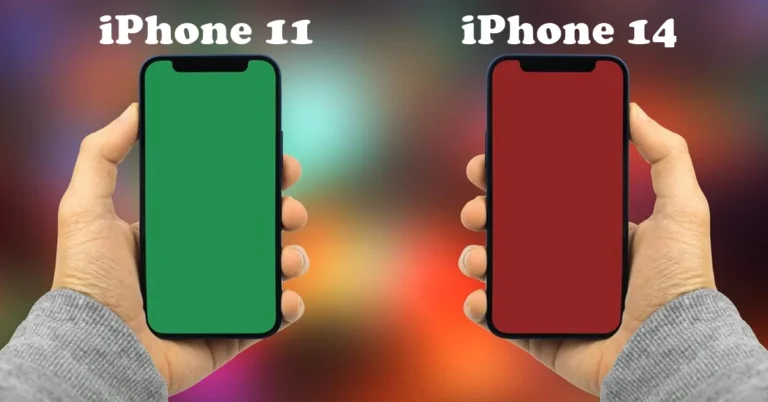When it comes to purchasing a new iPhone, the decision can be overwhelming given the many models that Apple releases each year. Among the most popular models in recent years are the iphone 11 vs 14. Both devices are packed with powerful features, but they cater to different users with distinct needs. In this comprehensive guide, we’ll compare the iPhone 11 and iPhone 14 to help you understand the major differences and decide which one is better suited for you.
TRENDING
AA Meetings Format: A Simple Guide For Structure & Success
Overview: iPhone 11 Vs iPhone 14
Before diving into the details, let’s take a quick look at the core features of the two iPhones.
iPhone 11
Released in September 2019, the iPhone 11 was Apple’s entry-level flagship model at the time. It offers a balance of performance, camera quality, and design at a more affordable price point compared to the iPhone 11 Pro models. The iPhone 11 comes with a 6.1-inch Liquid Retina display, dual-camera system, and the A13 Bionic chip, which was incredibly powerful when it was released.
iPhone 14
Launched in September 2022, the iPhone 14 series offers significant upgrades in terms of performance, display, camera technology, and overall features. The iPhone 14 models are powered by the A15 Bionic chip (with a 5-core GPU), offer improved camera systems, enhanced safety features like crash detection, and provide longer battery life.
Key Differences Between iPhone 11 And iPhone 14
Let’s break down the major differences between the two models to help you make an informed choice.
Display and Design
iPhone 11:
- Display: 6.1-inch Liquid Retina HD display
- Resolution: 1792 x 828 pixels, 326 ppi
- Design: Glass front and back, aluminum frame
- Refresh Rate: 60Hz
iPhone 14:
- Display: 6.1-inch Super Retina XDR OLED display
- Resolution: 2532 x 1170 pixels, 460 ppi
- Design: Ceramic Shield front cover, glass back, aluminum frame
- Refresh Rate: 60Hz, but with better HDR support
While both phones offer a similar 6.1-inch display size, the iPhone 14 features an OLED display, which offers brighter colors, deeper blacks, and higher resolution compared to the iPhone 11’s LCD screen. The iPhone 14’s Ceramic Shield also provides better durability and drop protection.
Performance and Processor
iPhone 11:
- Chipset: A13 Bionic chip
- RAM: 4GB
- Storage Options: 64GB, 128GB, 256GB
iPhone 14:
- Chipset: A15 Bionic chip (5-core GPU)
- RAM: 6GB
- Storage Options: 128GB, 256GB, 512GB
The iPhone 14 comes with the newer and more powerful A15 Bionic chip, which provides enhanced performance in gaming, multitasking, and overall system operations. The additional RAM in the iPhone 14 allows for smoother multitasking and more efficient performance, especially when handling resource-intensive applications.
Camera System
iPhone 11:
- Rear Cameras: Dual 12MP (wide and ultra-wide)
- Front Camera: 12MP
- Night Mode: Available only on the main camera
- Video Recording: 4K video at 24, 30, or 60 fps
iPhone 14:
- Rear Cameras: Dual 12MP (wide and ultra-wide) + Photonic Engine for better image processing
- Front Camera: 12MP TrueDepth with autofocus
- Night Mode: Available on both front and rear cameras
- Video Recording: 4K video at 24, 30, or 60 fps with improved low-light performance and stabilization
The iPhone 14 has a significant camera upgrade, especially with the introduction of the Photonic Engine, which improves low-light performance and color accuracy. The front camera is also enhanced with autofocus, making selfies and video calls much sharper.
Battery Life and Charging
iPhone 11:
- Battery Life: Up to 17 hours of video playback
- Charging: Supports 18W fast charging, Qi wireless charging
iPhone 14:
- Battery Life: Up to 20 hours of video playback
- Charging: Supports 20W fast charging, MagSafe wireless charging
The iPhone 14 provides slightly better battery life, lasting up to 20 hours of video playback compared to the iPhone 11’s 17 hours. It also supports MagSafe charging, which allows for wireless charging with accessories like MagSafe cases and chargers.
Safety Features
iPhone 11:
- Face ID
- No Crash Detection
iPhone 14:
- Face ID
- Crash Detection: Can detect car accidents and alert emergency services
The iPhone 14 comes with the new Crash Detection feature, which uses sensors to detect if you’ve been in a severe car accident and can automatically alert emergency responders, which is a life-saving feature.
6Connectivity
iPhone 11:
- 5G: No support for 5G (only supports 4G LTE)
- Wi-Fi: Wi-Fi 6
iPhone 14:
- 5G: Supports 5G connectivity
- Wi-Fi: Wi-Fi 6
The iPhone 14 supports 5G, which allows for faster data speeds compared to the 4G LTE support in the iPhone 11. This is particularly important if you want faster internet speeds for streaming, gaming, or downloading large files.
Which iPhone Is Better For You?
Deciding between the iPhone 11 and iPhone 14 comes down to several factors, including your budget, desired features, and how you use your phone.
iPhone 11: Best for Budget-Conscious Buyers
If you’re looking for an iPhone that offers solid performance, a good camera, and excellent battery life at a lower price, the iPhone 11 is still a great option. It’s an excellent choice if you don’t need the latest features like 5G or crash detection. With the iPhone 11, you’ll get access to Apple’s iOS ecosystem, high-quality performance, and a reliable camera system.
iPhone 14: Best for Those Seeking the Latest Features
On the other hand, the iPhone 14 is the better option for those who want the latest and greatest in smartphone technology. With better performance, an enhanced camera system, 5G support, longer battery life, and critical safety features like Crash Detection, the iPhone 14 is perfect for users who need cutting-edge features and reliability.
Conclusion
The iphone 11 vs 14 both offer solid performance, but the iPhone 14 is a significant upgrade with better cameras, more advanced features, and longer-term reliability. If you’re on a budget and don’t need the latest technologies, the iPhone 11 remains a great choice. However, if you want the best iPhone experience with improved safety features, performance, and future-proofing, the iPhone 14 is the way to go.
Ultimately, the best iPhone for you will depend on your priorities: whether you’re after value for money or cutting-edge technology. Either way, both models will provide a premium iPhone experience.
ALSO READ: Elephant Butt Facts: Anatomy, Behavior, And Fun Insights
FAQs
What is the difference between iPhone 11 and iPhone 14?
The iPhone 14 offers several improvements over the iPhone 11, including a better OLED display, more powerful A15 Bionic chip, enhanced camera system, longer battery life, and safety features like Crash Detection. The iPhone 14 also supports 5G, while the iPhone 11 only supports 4G LTE.
Does the iPhone 14 have a better camera than the iPhone 11?
Yes, the iPhone 14 has a significantly improved camera system. It features the Photonic Engine for better low-light performance and improved color accuracy. The front camera also supports autofocus, offering better selfie quality. Additionally, the iPhone 14 supports Night Mode on both the front and rear cameras.
Is the iPhone 14 worth the extra cost?
If you value advanced features like a better display, 5G support, improved performance, and enhanced safety features (like Crash Detection), the iPhone 14 is worth the extra cost. However, if you don’t need the latest features and are on a budget, the iPhone 11 still offers great performance at a lower price.
Can I use the iPhone 11 for gaming?
Yes, the iPhone 11 can handle most mobile games well, thanks to its A13 Bionic chip. However, the iPhone 14’s A15 chip and additional RAM provide better performance for high-end gaming and multitasking.
How long will the iPhone 11 and iPhone 14 last?
Both the iPhone 11 and iPhone 14 should last several years with regular software updates. However, the iPhone 14 has a more powerful processor and better overall performance, which may ensure it remains relevant for a longer time compared to the iPhone 11.

